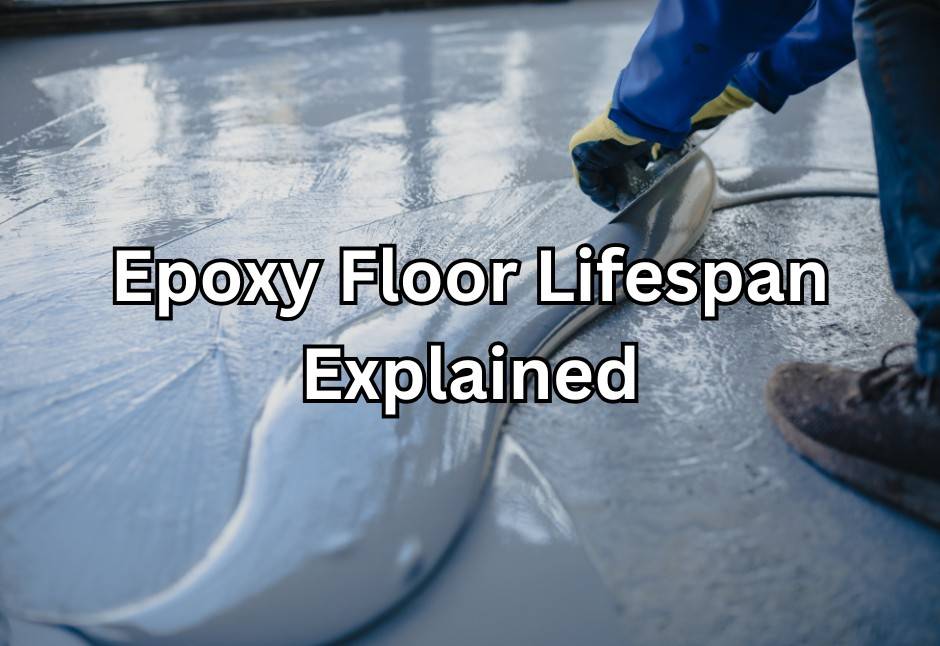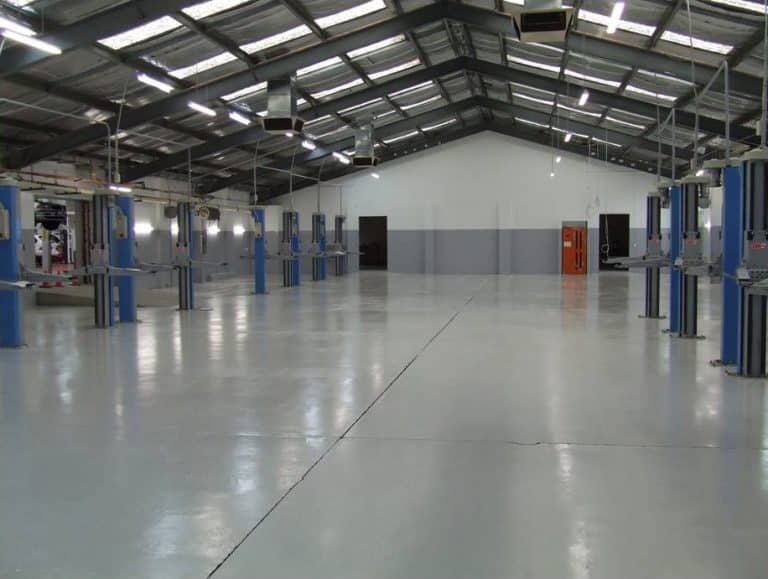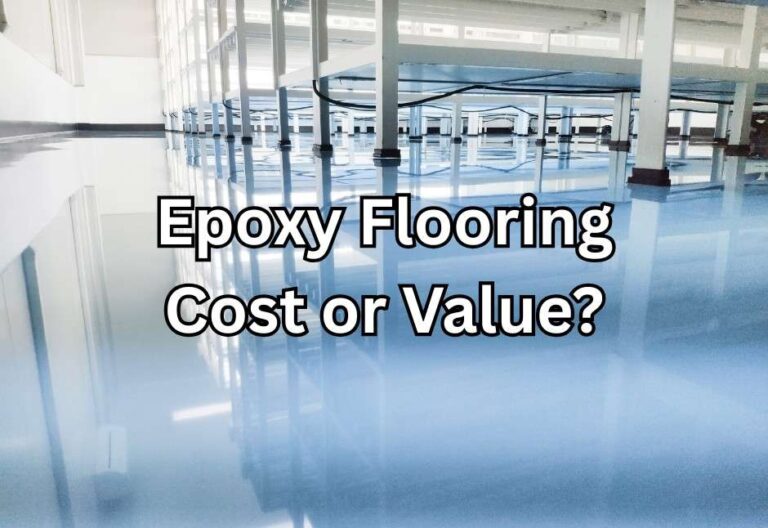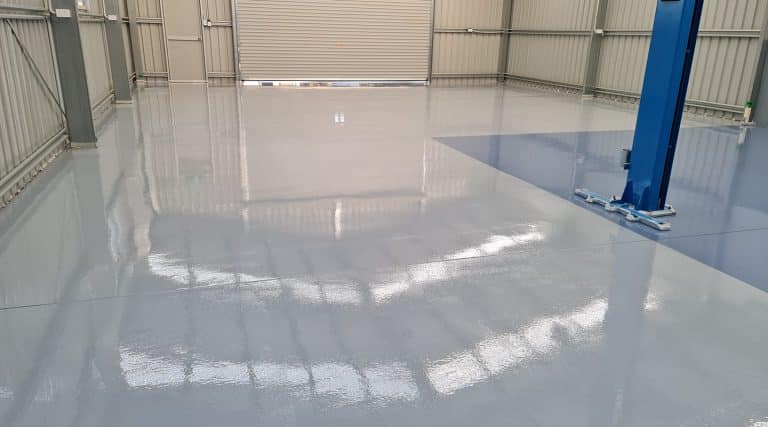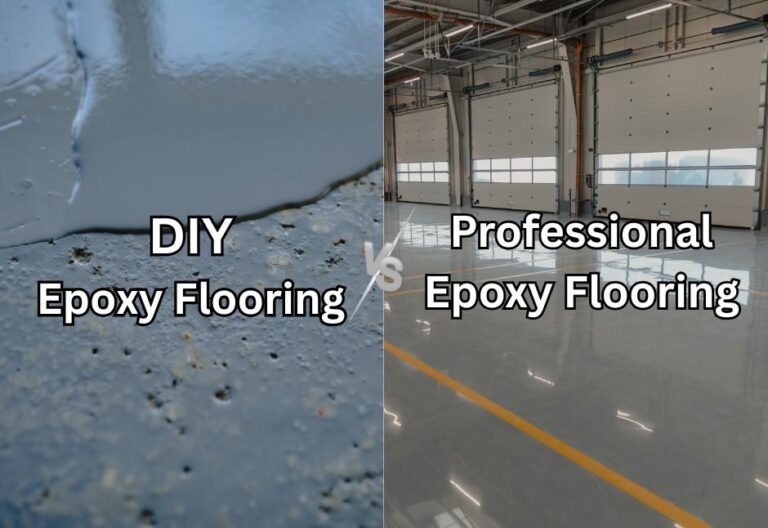How Long Does Epoxy Flooring Last? Lifespan & Durability Factors
So, you’re considering epoxy flooring. Smart move. However, the question that everyone seeks to have answered before making a commitment is, how long will this material truly last?
The concise response is “Anywhere from 5 to 30 years.” The answer can range from 5 to 30 years. Yeah, that’s a massive range. But here’s the thing—how long epoxy floors last really does depend on so much more than most people think. Now, let’s discuss the pertinent aspects.
What Affects Epoxy Floor Longevity?
Look, I’ll level with you. There is no one-size-fits-all magic number. Your epoxy plate’s life is determined by a mix of controllable and uncontrollable factors.
The Quality of the Product itself
Epoxy is not all the same. Full stop.
If you’re lucky, the most basic of DIY kits from a hardware store will last 3-5 years. Commercial-quality epoxy systems will often have no problem reaching or surpassing the third-decade mark.
That’s because it is just like house paint—those two cans of white look the same on a shelf, but one fades and peels way before the other can even begin to show its age. Same deal with epoxy.
Installation Matters More Than You’d Think
You may have invested in the best epoxy your money can get, but low-grade installations will blow your cash.
Most DIY jobs go awry during the surface prep stage. Concrete must be free of dirt, dust and oil; it must be dry and properly profiled. Anything that comes into contact with the concrete also creates a weak point, which can result in peeling and bubbling.
Professional installers will also have the tools to properly prep surfaces and apply finishes at the appropriate thicknesses. Standards such as ASTM C881 or ICRI standards are not simply suggestions; they are established procedures, distinguishing floors that only last a good 5 years from those that are still going strong at 20.
This is our PM Industries promise to you and your company where commercial and industrial floor coating services are concerned.
The Type of Space You’re Putting It In
Residential garages are one thing. Industrial warehouses? Industrial warehouses are entirely different from residential garages.
A floor that occasionally experiences foot traffic and the rare passing car can last much longer than a floor subjected to forklifts, heavy machinery, and constant chemical exposure. It seems to make logical sense.
Different spaces, different lifespans:
- Home garages: 10-20 years, if you take care of them.
- Retail: 10-15 years, depending on foot traffic.
- Warehouses and industrial facilities: 15-30 years if properly maintained.
- Commercial kitchens: 5-15 years (grime and grit can wear them out).
- Workshops: 10-20 years if you’re not a mad bugger with them.
The pattern here is straightforward enough. Lower stress equals longer life. But there are even high-stress environments that enjoy impressive longevity—if you’ve had the right system in place from day one.
Durability Factors That Actually Make a Difference
People spend a lot of time trying to get the colours, effects, and finishes right, but they often overlook the performances, which actually determine how long the floor will last. Here’s what really matters.
Chemical Resistance
That’s big for some applications. Epoxy flooring truly excels due to its resilience against everyday chemicals. High-quality epoxy is resistant to oils, solvents, and acids.
But even the strongest epoxy has its limits. “Let aggressive chemicals sit on the surface longer? Even professional-grade coatings will eventually break down. Quick clean-ups are excellent here.
Impact Resistance
Epoxy is very hard, but it’s not indestructible.
Here’s what it excels at versus what can find you in trouble:
- Company dropping tools and gear: none.
- Forklift traffic: holds up brilliantly.
- Strong, sharp knocks can chip or crack, particularly if the concrete underneath isn’t sound.
The good news? These are typically fixable without having to refinish the entire floor.
UV Exposure
Epoxy doesn’t love direct sunlight. UV light will eventually fade and degrade epoxy materials.
It’s also why polyurethane topcoats are frequently used on sunlit areas—they work the way sunscreen does for your floor. Indoor applications won’t have as much to worry about.
The Real-World Performance Breakdown
What can you anticipate in various locations?
Residential Applications
The friendliest place to epoxy anything is in your home’s garage, workshop, or basement. If you take care of them and don’t abuse them, you could easily get a good 15–20 years out of them. Some homeowners go even longer, particularly if they’re the kind of people who genuinely take care of their stuff.
The epoxy flake systems that PM Industries lays in residential environments are especially suitable for this. The flakes also provide additional texture and grip and obscure small imperfections and wear patterns.
Commercial Settings
This next step varies a bit more given the environment:
- Boutique retail with light foot traffic: 15+ years.
- Restaurants and cafes typically require refreshing every 1-3 years, while those with high traffic may need it every 7-12 years.
- Commercial kitchens with food-grade flooring: 10–15 years of constant exposure to heat, moisture, and chemical cleaning.
Considering the extreme abuse these floors endure, achieving that last one is quite an accomplishment.
Industrial Environments
This is where epoxy earns its keep:
- Epoxy can last 20 to 30 years in warehouses and manufacturing plants.
- Heavy machinery and chemicals: still going strong with some little maintenance here.
- Constant forklift traffic: nothing to fear if installed properly.
The return on investment for that kind of longevity is difficult to argue with.
Maintenance: The Secret Ingredient
So, what’s the key to maximising the lifespan of an epoxy floor? Proper maintenance.
Quality of maintenance is an important factor that determines the longevity of flooring. SL calculates. In fact, studies from “The Life Expectancy of Home Components” also concluded quality>quantity when it comes to in-home maintenance.
And with regular maintenance, you can increase the lifespan of your floor by a decade or more.
Regular Cleaning
This is a straightforward process. Regularly sweep away dirt and grit – which is like sandpaper under traffic. Mop periodically with a gentle cleaner. And that’s about it for maintenance.
They are not easily damaged due to wear and tear, but keep them away from harsh cleaning agents that can slowly eat away the epoxy. Most citrous-based degreasers are acceptable, but avoid using acidic cleaners unless you are knowledgeable about their effects.
Dealing with Damage Promptly
See a chip or crack? Sort it out quickly. Small fixes are inexpensive and quick. If you ignore them, moisture can penetrate underneath the layer and cause much bigger problems.
Most professionals can typically patch minor damage in less than a day. I feel that the level of maintenance depends on the area, which is why PM Industries provides concrete resurfacing whenever you may need it.
Protective Measures
“If you are using it in a commercial or industrial space, then consider protection:
- Floor mats in high-traffic areas.
- Furniture pads under heavy equipment.
- How to lift heavy objects the correct way.
- Frequent inspections to get ahead of problems.
All those small measures add years to the life of your floor. For concrete surfaces that aren’t ready for epoxy but are in need of protection, PM Industries offers sealing services to help increase their lifespan and protect your investment.
When Does Epoxy Need Replacing?
Nothing lasts forever. At what point should you consider replacing your epoxy floor rather than opting for repairs?
Look for these signs:
- Large-scale peeling or delamination indicates that the adhesive is breaking down.
- The concrete surface below may exhibit significant cracks or damage.
- Noticeable colour changes and yellowing that go away with washing.
- Numerous zones constantly need patching up.
- You are altering the intended use of your floor.
If you are experiencing one or two of these issues, it is time to seriously consider replacement rather than opting for another patchwork solution.
Getting the Most From Your Investment
If you are dead set on getting the most mileage out of your epoxy floor,
Here’s what really does work:
- Start with professional installation: yeah, it costs a bit more up front, but the extended life span more than makes up for the cost difference. DIY jobs tend to have lifespans of 3–5 years, while professional installations we installed are still functioning today after 15+ years!
- Customise the system you serve: a garage doesn’t require the same spec as a commercial kitchen. Select the product that best fits your needs!
- Don’t skip the topcoat: that second layer of protection, be it a layer of polyurethane for UV resistance or another coat of epoxy for thickness, adds years to its life.
Different Systems, Different Lifespans
Epoxy flooring is really more general.
Here’s what you can expect from various systems:
- Standard epoxy coatings are your normal choice; they last about 10–15 years in mild conditions.
- Flake decorative epoxy: 15-20+ years. The wash look, stone look, and wood look solutions available at PM Industries combine stunning design with hardcore durability.
- Polyurethane cement: Heavyweight for food processing and abusive Danielson, CT – I am quickly improving the appearance and profile of my shop!
- Multicoat systems are the longest-lasting of the options, with durability frequently stretching to 20–30 years in commercial and industrial applications.
The takeaway here? Generally, investing a little more in the right system from the beginning is often more cost-effective over time than replacing a budget AC unit halfway through its expected lifespan, especially considering that standard reinstall costs usually apply.
Location-Specific Considerations
Epoxy to some degree benefits from the weather we get in Perth. The dry climate also results in fewer moisture-related problems than the wetter areas of Australia. But up against that intense summer sun, outdoor or at least semi-exposed areas can take a beating.
If you live in coastal areas like Rockingham or Mandurah, the salty air is a factor. Modern epoxy systems effectively address this issue, yet it remains an additional environmental factor that influences longevity.
So, What’s the Bottom Line on Epoxy Floors?
Please provide information on the lifespan of epoxy flooring. The lifespan of epoxy flooring varies: for residential DIY installations, it lasts 5–10 years; professionally installed residential floors last 10–20 years; commercial floors last 7–15 years; and in industrial settings, under optimal conditions, they can last 15–30 years if only the minimum maintenance is performed.
But those figures capture only part of the picture. Quality materials and installation skill play giant roles, as do maintenance habits.
But the most important thing is to choose the right system and install it correctly. Ensure proper installation, similar to PM Industries’ commercial and industrial floor coating systems, which can offer years of trouble-free use.
Even on the high side of professional installation prices, if you get 20+ years out of it, your annual cost is pretty damn reasonable.
Are you ready to have a floor that will actually last? Call PM Industries to discuss your flooring requirements.

